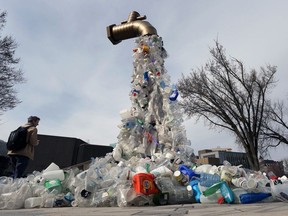It is not enough to better manage plastic waste or rely on recycling. We must drastically reduce plastic production.

Article content
Plastic pollution is one of the biggest environmental problems facing our planet today. It is estimated that 20 billion metric tons of plastic will be generated in 2040, double what was produced in 2020.
From entanglement, mutilation, strangulation and suffocation of marine life to the health effects and diseases associated with plastics and their chemicals, plastic pollution in the marine environment is a growing global crisis that demands urgent attention.
Advertisement 2
Article content
Article content
Four years ago, the United Nations Environment Assembly committed to developing a legally binding international treaty on plastic pollution, including in the marine environment. The international committee charged with developing this treaty currently meets in Ottawa from April 21 to 29, the penultimate meeting before a finalized treaty is ratified.
Ahead of this meeting, the Coalition of Scientists for an Effective Treaty is calling for the treaty to commit to reducing the production of “virgin plastic.” Technically known as primary plastic polymers, or PPP, they are materials made from synthetic and semi-synthetic polymers that are being used for the first time to create plastic products in any form.
In short, they are entirely new plastics, often made from fossil fuels. Almost all or most plastics are produced by the petrochemical industry. These PPPs and new plastic products are associated with thousands of chemicals, many of which are known to be persistent, bioaccumulative, mobile and toxic, known as PBMT chemicals.
It is not enough to better manage plastic waste or rely on recycling. We must drastically reduce plastic production. We can attack the root of the plastic pollution problem by abandoning the extraction of raw materials for fossil fuels by defining and implementing binding national targets.
Advertisement 3
Article content
The coalition’s recommendations include implementing multi-stakeholder processes based on robust, evidence-based policy free of conflicts of interest, supported by transparent monitoring, reporting and evaluation processes based on five pathways. reduction process with implications for humans and the environment. health:
• One: Reduce non-essential material and plastics.
• Two: Reduce harmful, unsafe and unsustainable plastics.
• Three: Increase transparency and accountability, including that industries must be responsible throughout the entire life cycle of plastics, from plastic contamination to remediation.
• Fourth: Improve compliance mechanisms.
The coalition also calls on the committee to encourage evidence-based assessments of sustainability, safety, essentiality and transparency criteria to ensure safe and sustainable plastics production and consumption.
For example, transparency criteria mean that producers must disclose the composition of chemicals and materials present in plastics from extraction to production, and information on tracking, tracking, traceability, marking and labeling.
Advertisement 4
Article content
Likewise, the essentiality criteria require eliminating non-essential, dangerous and unsustainable uses of plastic. When plastic is considered “essential”, such as the application of plastics in medical devices or plastics used in developing countries or remote and rural areas to provide basic services and disinfection, it must be replaced with safer and more sustainable alternatives.
The committee should incorporate these evidence-based arguments before its final session in November to ensure they are present in the final treaty text. It is imperative to have a strong and proactive treaty that curbs growing plastic pollution.
Intermediate or subsequent measures are insufficient: we must significantly reduce the extraction and production of non-essential virgin plastics. This recommendation is essential to end plastic pollution in the marine environment.
This week, following Earth Day on April 22, we must all call for an end to plastic pollution for the sake of human health, biodiversity and the planet, demanding a 60 percent reduction in plastic production for 2040 with the ultimate goal of building a plastic-free future for generations to come.
Juan José Álava and Ibrahim Issifu are members of the Coalition of Scientists for an Effective Plastics Treaty and researchers at the Institute of Oceans and Fisheries at the University of BC.
Recommended by Editorial
-
Cohen: Everywhere, this Easter, in this world, we seek freedom from small minds and cold hearts.
-

Deachman: City should focus on saving events we already have
Article content

